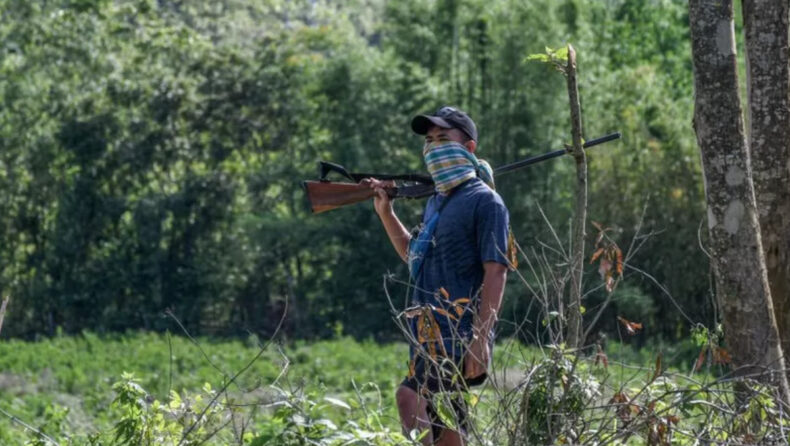Manipur, a state in north-east India with a population of around three million is engulfed by the fire; fire of ethnic conflict. The people of Manipur are dying yet their cries are falling on deaf ears. For their cries are met only with silence.
Manipur has a history of ethnic rivalry that dates back to before the country became independent in 1947. Recently in Manipur, violence has erupted between the majority Meitei community and the minority Kuki community.
Tension has been boiling between the two communities for some time now in the state that is driven by the Meitei-controlled state government. Manipur’s government was accused of pursuing policies that discriminated against Kukis, including forced evictions that threatened the security of their land, and through an attempt to cast them as illegal immigrants.
The spark to the violence came in the form of a court ruling in March that granted the majority Meitei “scheduled tribal status”, thus, giving them the same economic benefits and quotas in government jobs and education as the minority Kuki. It gave Meities the right to buy land in the hills, where the Kukis predominantly live which further fuelled their fear for their lands, jobs, and opportunities. This court decision resulted in a protest, mostly by Kuki student groups which was met with violence, and by early May, it had escalated into all-out violence.
Meitei gangs started attacking Kuki residences in Imphal, the state capital, and Kuki people who tried to leave the city for the hills, where they hold a majority of the land, were attacked. Meitei militias, numbering in the hundreds or even thousands, also destroyed Kuki settlements.
By the time the stay order from the Supreme Court on the earlier decision by the lower court came on the grounds of “factually wrong”, the conflict had already taken hold.
The unfurling of the violence in Manipur:
The majority of the earliest attacks on the Kuki villages and communities were carried out by Meitei gangs. Villages were burned down, and the Christian Kuki community’s more than 250 churches were destroyed as the fighting expanded.
As false reports and misinformation about Kukis killing and raping Meitei women spread, Kuki women started to be specifically targeted in retaliation attacks that included rape, torture, and abuse. Beheadings have also been mentioned in a number of reports.

Numerous homes belonging to members of both communities were burned down or destroyed, along with churches and temples. It is believed that 60,000 individuals from both communities remain homeless, most of whom are currently residing in schools, sports stadiums, and other shelters since they are unable to go back home.
A buffer zone was established in the center of the state, which was quickly divided along ethnic lines, with the Meiteis defending their land against violent crowds in the valley and the Kukis in the hills. It quickly became understood that crossing into the area of the rival tribe meant certain death. Numerous thousands of guns taken from army and police camps have been used to combat a large amount of the violence.

The clash between the two tribes has not only renewed but also strengthened the longstanding demand for the Kukis for their own separate state. The violence has proved, according to the Kuki, that they can no longer live safely under the oppressions of a Meitei-dominant state. They have pledged to fight until they are granted their own state.
Violence against women in Manipur;
Two Kuki-Zomi women were paraded naked on May 4 by a group of Meitei males. Her father and brother, who was 19 years old, were supposedly murdered, and the younger woman was gang-raped. According to Indian rape laws, the family cannot be recognized.
“I wanted to commit suicide after seeing how my daughter was handled after my husband and son were slain. A church elder, my husband. He had a nice and gentle demeanor. Knives were thrust into his arms. My son, a kind young man who never got into arguments with others, was in his 12th grade. She wailed as she said, “He was severely beaten with rods.
“In an effort to defend his sister, he raced after them (the crowd) and was slain. My daughter is still not well. They were murdered in her presence. She struggles with both eating and sleeping. As a result of what was done to my family, I can never feel at peace,” she told BBC.

This news made the world listen to Manipur and forced PM Modi to break his silence.
How has the government responded?
The central BJP government’s reaction was noticeably subdued even as the violence increased. The Meitei-dominated BJP state government has been charged with enabling Meitei gangs to carry out violence against the Kuki minority with impunity.
PM Modi has faced criticism for not mentioning those who have lost their lives in battle or the larger struggle. Some claim that the Hindu nationalist Modi government is not intervening to defend the Christian Kukis from the Hindu Meitei.
Amit Shah, the home minister of India, paid a visit to Manipur at the end of May, but he was unable to broker a truce between the factions or bring them together for talks. Kuki factions have avoided Shah’s “peace committee” because they believe Meitei leaders, including the BJP chief minister, control it.
The administration was reprimanded by the Supreme Court for failing to handle the situation in Manipur. It’s time for the government to truly intervene and take action, Chief Justice Dhananjaya Chandrachud stated, as this is just unacceptable.













